维多利亚时代【英文】
- 格式:pps
- 大小:6.12 MB
- 文档页数:18
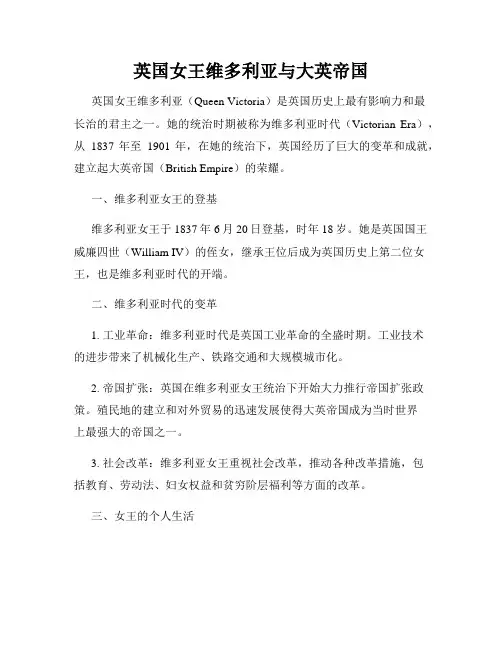
英国女王维多利亚与大英帝国英国女王维多利亚(Queen Victoria)是英国历史上最有影响力和最长治的君主之一。
她的统治时期被称为维多利亚时代(Victorian Era),从1837年至1901年,在她的统治下,英国经历了巨大的变革和成就,建立起大英帝国(British Empire)的荣耀。
一、维多利亚女王的登基维多利亚女王于1837年6月20日登基,时年18岁。
她是英国国王威廉四世(William IV)的侄女,继承王位后成为英国历史上第二位女王,也是维多利亚时代的开端。
二、维多利亚时代的变革1. 工业革命:维多利亚时代是英国工业革命的全盛时期。
工业技术的进步带来了机械化生产、铁路交通和大规模城市化。
2. 帝国扩张:英国在维多利亚女王统治下开始大力推行帝国扩张政策。
殖民地的建立和对外贸易的迅速发展使得大英帝国成为当时世界上最强大的帝国之一。
3. 社会改革:维多利亚女王重视社会改革,推动各种改革措施,包括教育、劳动法、妇女权益和贫穷阶层福利等方面的改革。
三、女王的个人生活1. 皇室婚姻:维多利亚女王与德国亲王阿尔伯特(Prince Albert)在1840年结婚,这场皇室婚姻是爱情婚姻的典范,夫妻俩共同育有九个孩子。
2. 丧偶与忧郁:1861年,阿尔伯特亲王去世,这对女王打击极大,她一直陷入长期的悲痛和忧郁之中,对朝政产生了一定的消极影响。
四、大英帝国的辉煌1. 扩张与殖民地:维多利亚女王的统治下,大英帝国在世界各地建立了大量的殖民地,包括印度、加拿大、澳大利亚、新西兰、南非等地。
2. 文化繁荣:维多利亚时代也是英国文化的繁荣期,许多伟大的作家、艺术家和科学家在这个时期涌现出来,如狄更斯(Charles Dickens)、达尔文(Charles Darwin)、莎士比亚(William Shakespeare)等。
3. 工业与科技:维多利亚时代见证了工业技术的飞速发展,如蒸汽机、电力、电话和摄影等科技的出现对人类社会产生了深远影响。
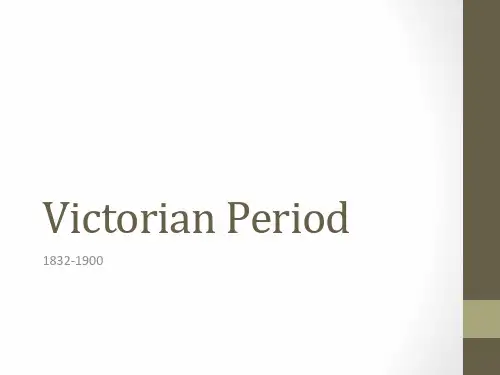
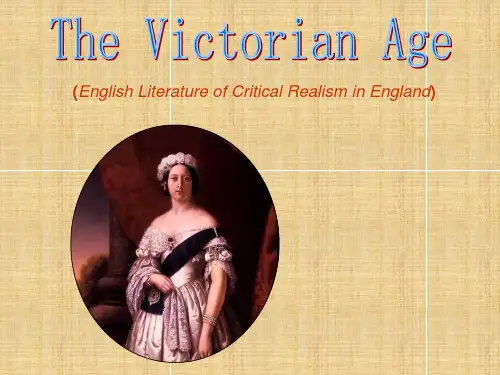
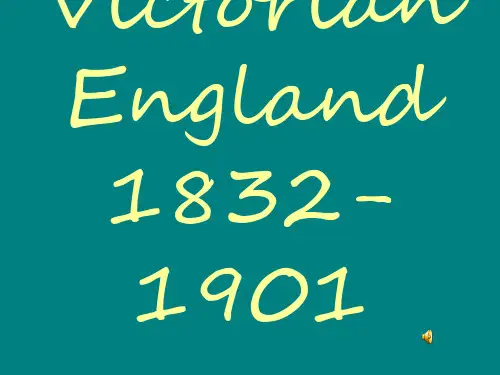
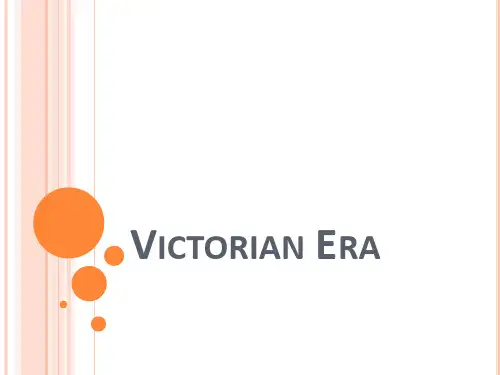
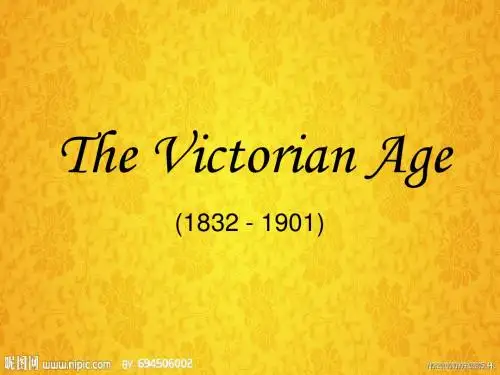
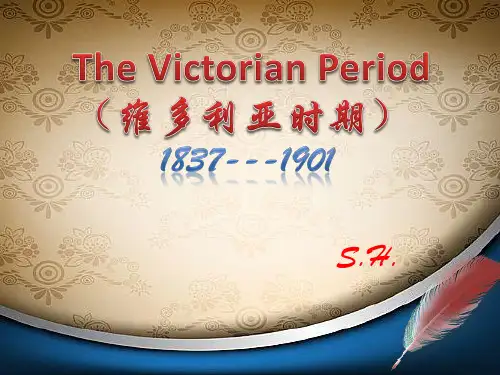
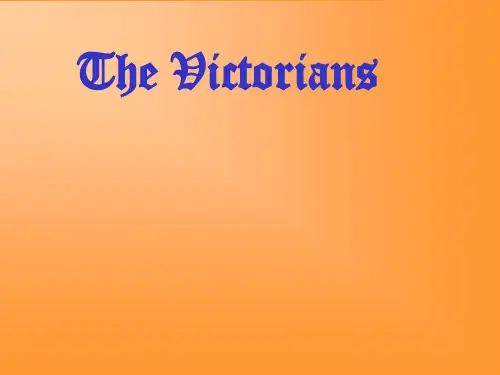
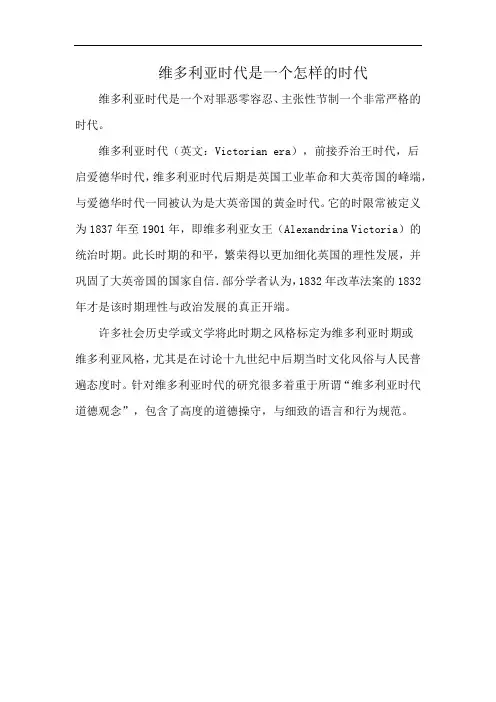
维多利亚时代是一个怎样的时代维多利亚时代是一个对罪恶零容忍、主张性节制一个非常严格的时代。
维多利亚时代(英文:Victorian era),前接乔治王时代,后
启爱德华时代,维多利亚时代后期是英国工业革命和大英帝国的峰端,与爱德华时代一同被认为是大英帝国的黄金时代。
它的时限常被定义为1837年至1901年,即维多利亚女王(Alexandrina Victoria)的统治时期。
此长时期的和平,繁荣得以更加细化英国的理性发展,并巩固了大英帝国的国家自信.部分学者认为,1832年改革法案的1832年才是该时期理性与政治发展的真正开端。
许多社会历史学或文学将此时期之风格标定为维多利亚时期或
维多利亚风格,尤其是在讨论十九世纪中后期当时文化风俗与人民普遍态度时。
针对维多利亚时代的研究很多着重于所谓“维多利亚时代道德观念”,包含了高度的道德操守,与细致的语言和行为规范。
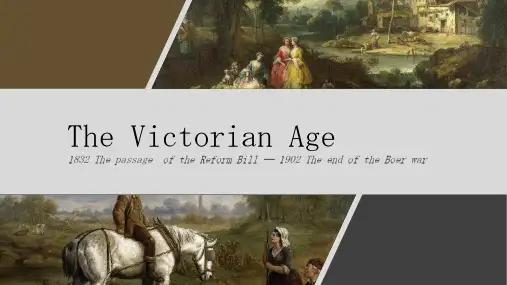

victorian period名词解释
维多利亚时期(Victorian period)指的是1837年至1901年之间,维多利亚女王统治英国的时期。
这是英国工业革命的巅峰时期,也是英国经济、文化和科学发展的黄金时代。
维多利亚女王在位期间,英国从一个农业为主的国家转变为一个工业和商业强国,成为了全球最大的经济体。
同时,维多利亚时期也是英国文学、艺术和建筑的重要时期,许多经典作品和建筑在这一时期诞生。
此外,维多利亚女王本人也成为了一个文化象征,她的形象和价值观影响了整个欧洲和北美。
六.维多利亚时期(Victorian Era 1837年—1901年)查尔斯·狄更斯(Charles Dickens)杰出的小说家,批判现实主义(Critical Realism)的代表人物。
代表作《波兹特写》(Sketches by Boz),《匹克维克外传》(The Posthumous Papers of the Pickwick Club),《雾都孤儿》(Oliver Twist),《老古玩店》(The Old Curiosity Shop),《美国札记》(American Notes),《董贝父子》(Dombey and Son),《大卫·科波菲尔》(David Copperfield),《荒凉山庄》(Bleak House),《艰难时世》(Hard Times),《双城记》(A Tale of Two Cities),《远大前程》(Great Expectations)。
威廉·麦克皮斯·萨克雷(William Makepeace Thackeray):杰出的批判现实主义(Critical Realism)的小说家。
代表作长篇小说《名利场》(Vanity Fair),《亨利·艾斯蒙德》(Henry Esmond),《纽可姆一家》(The Newcomers)。
勃朗特三姐妹(The Bronte Sisters):夏洛特·勃朗特(Charlotte Bronte)的《简爱》(Jane Eyre);艾米丽·勃朗特(Emily Bronte)的《呼啸山庄》(Wuthering Heights);安尼·勃朗特(Anne Bronte)的《安格尼斯·格雷》(Agnes Grey)。
乔治·艾略特(George Eliot):著名的现实主义女作家。
代表作《亚当·比德》(Adam Bede),《弗罗斯河上的磨坊》(The Mill on the Floss),《织工马南》(Silas Marner),《米德尔马契》(Middlemarch—A Study of Provincial Life)。
When it comes to Victorian Age, we can all imagine the prosperity of Britain. In the period, the Queen Victorian became the symbol of peace and prosperity in the English history.During the Victorian Age, economic, social, and political changes occurred in Britain, which made “the sun never sets on England”. With the development of industrialization, the size of the cities grew very quickly. What’s more, lots of people received the right to vote, which improves t he liberation of people's thoughts.In addition, The Victorian literature was also regarded as a high point in British literature as well as in other countries. The Novels, poetries, and dramas are always realistic. The works always started with strongly critical of the social reality, but ended up with a happy ending, which means an important compromise to current society.On the other side, there are still some problems in the Victorian Age. For example, in spite of the prosperity of the era, factory workers and farm workers lived in terrible poverty. It means that England was two nations, the poor and the rich. As a result, the class contradiction of that era increasingly difficult to reconcile, which has leaded a lot of problems to be solved.。
维多利亚时代特点(英文)When it comes to Victorian Age, we can all imagine the prosperity of Britain. In the period, the Queen Victorian became the symbol of peace and prosperity in the English history.During the Victorian Age, economic, social, and political changes occurred in Britain, which made “the sun never sets on England”. With the development of industrialization, the size of the cities grew very quickly. What’s more, lots of people received the right to vote, which improves t he liberation of people's thoughts.In addition, The Victorian literature was also regarded as a high point in British literature as well as in other countries. The Novels, poetries, and dramas are always realistic. The works always started with strongly critical of the social reality, but ended up with a happy ending, which means an important compromise to current society.On the other side, there are still some problems in the Victorian Age. For example, in spite of the prosperity of the era, factory workers and farm workers lived in terrible poverty. It means that England was two nations, the poor and the rich. As a result, the class contradiction of that era increasingly difficult to reconcile, which has leaded a lot of problems to be solved.。
The Victorian Age (1830-1901) Sambourne House, London.❑Victoria became queen atthe age of 18; she wasgraceful and self-assured.❑Her reign was the longestin British history.Franz Xavier Winterhalter, The young Queen Victoria, 1842❑In 1840 she married aGerman prince, Albert ofSaxe-Coburg.❑They had nine children andtheir modest family lifeprovided a model ofrespectability.❑During this time BritainFranz Xavier Winterhalter, The young Queen Victoria, 1842changed dramatically.British Empire throughout the World, 19th century, Private Collection.•England grew to become the greatest nation on earth “The sun never sets on England”.British Empire throughout the World, 19th century, Private Collection.•British Empire included Canada, Australia, New Zealand, Hong Kong, Singapore, South Africa, Kenya, and India.British Empire throughout the World, 19th century, Private Collection.•Great Britain imported raw materials such as cotton and silk and exported finished goods to countries around the world.British Empire throughout the World, 19th century, Private Collection.•By the mid-1800s, Great Britain was the largest exporter and importer of goods in the world. It was the primarymanufacturer of goods and the wealthiest country in the world.British Empire throughout the World, 19th century, Private Collection.•Because of England’s success,the British felt it was their duty to bring English values,laws,customs,and religion to the“savage”races around the world.•1832: The First Reform Act granted the vote to almost all male members of middle-class.•1833: The Factory Act regulated child labour in factories.•1834: Poor Law Amendment established a system of workhouses for poor people.•1867: The Second Reform Act gave the vote to skilled working men.•1871: Trade Union Act legalised trades unions.•1884: The Third Reform Act granted the right to vote to all male householders.•Women‟s suffrage did not happen until 1918.The Rights of Women or Take Your Choice (1869)4. The woman’s questionSuffragettesIndustrial revolution: factorysystem emerged; for the firsttime in Britain’s history therewere more people who lived incities than in the countryside.Technological advances:introduction of steam hammersand locomotives; building of a Workers in a Tobacco Factorynetwork of railways.Economical progress:Britainbecame the greatesteconomical power in the world;in 1901 the Usa became theleader, but Britain remainedthe first in manufacturing.Workers in a Tobacco FactoryCrystal Palace was built forthe Great Exhibition of1851; it was destroyed byfire in 1936.The Crystal PalaceIt was made of iron andglass, exhibited hydraulicpresses, locomotives,machine tools, power looms,power reapers andsteamboat engines.The Crystal PalaceIt had a political purposeit showed British economicsupremacy in the world.The Crystal PalacePollution in towns due to factory activity.Homeless Boys (1880)London in 1872Lack of hygienic conditions: houses were overcrowded, most people lived in miserable conditions; poor houses shared water supplies.Homeless Boys (1880)London in 1872•Epidemics , like cholera, thyphoid, caused a high mortality in towns. They came to a peak in the Great Stink of 1858.•This expression was used to describe the terrible smell in London, coming from the Thames .•The “Miasmas”, exhalations from decaying matter, poisoned the air.8. The “Great Stink”Caricature appearing on the magazine «Punch»in18589. The Victorian compromise •The Victorians were greatmoralisers theysupported: personal duty,hard work, decorum,respectability, chastity.W. H. Hunt, The Awakening Conscience,1853-4, London, Tate Britain.•…Victorian‟, synonym for prude, stood for extremerepression; even furniturelegs had to be concealedunder heavy cloth not to be“suggestive”.•New ideas were discussed &debated by a large part of society.W. H. Hunt, The Awakening Conscience, 1853-4, London, Tate Britain.•The middle-class wasobsessed with gentility,respectability, decorum.•Respectabilitydistinguished the middle fromthe lower class.John Lamb, Victorian family portrait, 1879.Decorum meant:a.Victorian private lives weredominated by an authoritarianfather.b.Women were subject to maleauthority; they were expected tomarry and make home a “refuge”for their husbands.John Lamb, Victorian family portrait, 1879.John Stuart Mill and hisideas based on Bentham’sUtilitarianism.John Stuart MillKarl Marx and his studiesabout the harm caused byindustrialism in man’s life. Karl MarxCharles Darwin andthe theory of naturalselection.Charles Darwin•There was a communion of interests and opinions between the writers and their readers.•The Victorians were avid consumers of literature. They borrowed books from circulating libraries and readvarious periodicals.•Novels made their first appearance in instalments on the pages of periodicals.•The voice of the omniscient narrator provided a comment on the plot and erected a rigid barrier between «right»and «wrong», light and darkness.•The setting chosen by most Victorian novelists was the town.•Victorian writers concentrated on the creation of characters and achieved a deeper analysis of their inner life.12. PoetryAlfred, Lord Tennyson:the most popularVictorian poet. He wrotenarrative poems.Alfred Tennyson, 1st Baron Tennyson, by George FredericWatts (died 1904), given to the National Portrait Gallery,London in 1895.Robert Browning: heraised the dramaticmonologue to new heightsmaking it a vehicle for adeep psychological study.Robert BrowningElizabeth Barrett Browning:she wrote love sonnets valuedfor their lyric beauty.Elizabeth Barrett Browning。